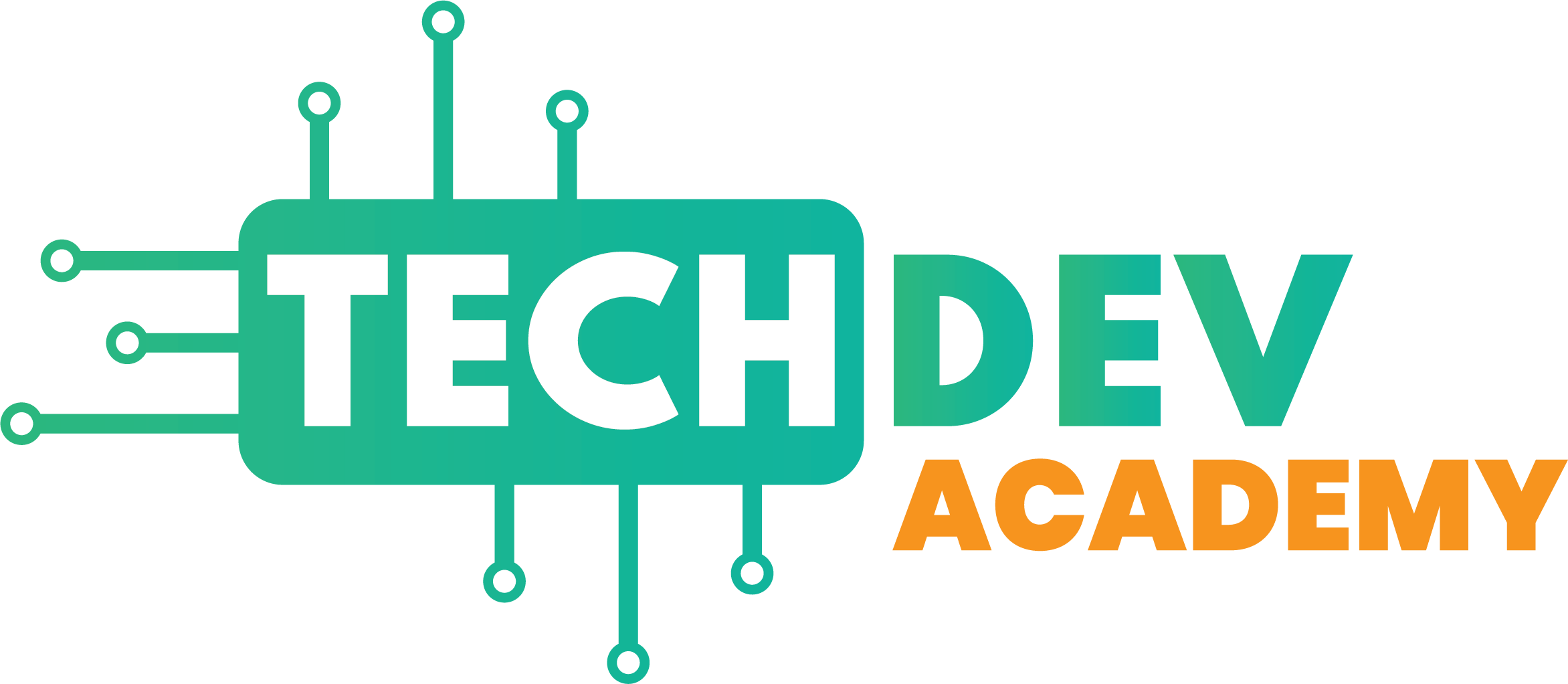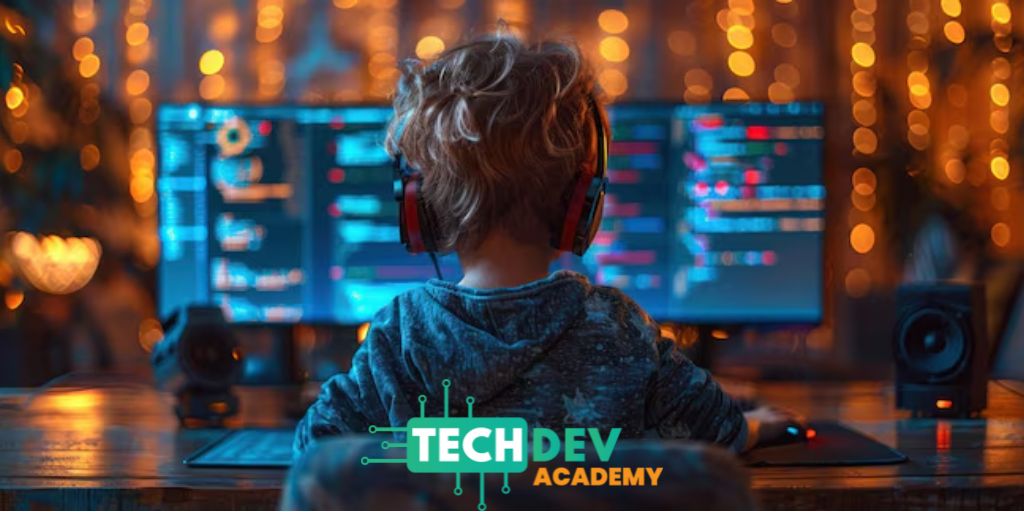In today’s tech-driven world, equipping children with future-ready skills is more important than ever. You might have heard about coding classes or seen kids engrossed in building games, but have you ever wondered about the deeper benefits of learning programming at a young age?
Learning to code from an early age can profoundly shape how children approach problems, make decisions. At TechDev Academy, we’re passionate about unlocking your child’s potential with the power of STEM education. We believe coding is a cornerstone of this development. This article explores why introducing your child to programming can be one of the most valuable investments in their cognitive and future success.
Why Early Coding Matters
Introducing children to the world of programming when they’re young isn’t just about getting a head start in a technical field. It’s about laying a strong foundation of mental habits and skills that benefit them across all areas of life. Think of it as a mental gymnasium where kids train their brains to become more powerful and flexible. Learning coding early can have the following advantages:
Cognitive Skills and Problem Solving
One of the most significant advantages of early coding is the development of crucial cognitive skills. When children learn to code, they learn to:
- Break Down Complex Problems: Programming tasks often involve large, seemingly overwhelming challenges. Coding teaches kids to decompose these into smaller, manageable parts. This skill, known as decomposition, is vital not just for writing software but for tackling academic assignments and real-world projects.
- Identify and Fix Errors (Debugging): Mistakes are a natural part of coding. Children learn to patiently review their work, identify errors (or “bugs”), and systematically test solutions. This process builds resilience, attention to detail, and an analytical mindset..
- Think Creatively: Contrary to what some might think, coding is an incredibly creative activity. Kids aren’t just typing lines of code; they’re designing games, creating animations, or building websites. They imagine something and then figure out how to bring it to life. Research from Tufts University on learning with Scratch showed that programming can support creative thinking by allowing students to design personally meaningful projects. Our students often showcase incredible creativity in programs like the Global Entrepreneurship Olympiad.
Building Logical Thinking
Logical thinking is the ability to reason systematically. It’s a highly important element of academic success and effective decision-making. Programming is inherently logical, and its practice reinforces this skill.
- Understanding Cause and Effect: In coding, every command has a specific outcome. Children learn quickly that if they want a character to jump, they need to write a particular line of code. This direct feedback loop helps them understand cause-and-effect relationships with clarity.
- Developing Algorithmic Thinking: Algorithms are step-by-step instructions for solving a problem or completing a task. When kids code, they are essentially designing algorithms. They learn to plan the sequence of operations and consider different scenarios. Studies, such as those observing children using educational programming tools like CodeSpark Academy, have indicated measurable improvements in computational thinking.
- Pattern Recognition: Coding often involves recognizing patterns in data or in the structure of problems. Identifying these patterns allows for more efficient solutions. This skill is transferable to many other disciplines, including mathematics and science.
For younger learners, languages like Scratch provide a visual, block-based introduction to these logical concepts, making them accessible and fun.
Long-Term Academic and Career Benefits
The advantages of learning to code young extend far beyond immediate cognitive gains. These foundational skills pave the way for enhanced academic performance and open doors to a wide array of future career opportunities. This early exposure to tech education is proving to be a critical factor for future success.
Tech Career Readiness
In an increasingly digital economy, proficiency in technology is no longer a niche skill but a fundamental one. The demand for tech skills is rapidly growing.
- High-Demand Skills: Programmers, software developers, data scientists, and cybersecurity analysts are among the most in-demand professionals globally. The U.S. Bureau of Labor Statistics (BLS) projects that employment for software developers is expected to grow 25% from 2022 to 2032, much faster than the average for all occupations. This translates to an average of about 153,900 openings for software developers, quality assurance analysts, and testers projected each year over the decade.
- Understanding Technology in All Fields: Even if a child doesn’t become a professional programmer, understanding how technology works is crucial. A report by the National Skills Coalition highlighted that an astounding 92% of jobs now require digital skills. This underscores the importance of tech literacy across nearly every career path.
- Innovation and Entrepreneurship: Coding empowers kids to become creators, not just consumers, of technology. This can spark an entrepreneurial spirit. Many successful tech entrepreneurs started coding at a young age, developing future-ready skills that allowed them to bring their ideas to life. This spirit is something we foster through initiatives like the Entrepreneurship Olympiad.
Academic Performance
The cognitive benefits of coding directly translate into improved performance in various academic subjects.
- Mathematics: The logical reasoning and problem-solving skills developed through coding have strong parallels with mathematical concepts. Research published by institutions like Luleå University of Technology in Sweden found that high school students using programming to solve mathematical problems showed an increased ability to develop their mathematical thinking and problem-solving strategies. Many students find that coding makes abstract math concepts more tangible.
- Writing and Language Arts: Structuring a program requires clarity, precision, and logical flow, similar to constructing a well-written essay. The process of debugging can even enhance attention to detail, a skill useful in proofreading.
- Science Subjects: Coding is increasingly used in scientific research for modeling, data analysis, and simulation. A foundational understanding gained early on can help students grasp these applications more easily in higher education and beyond.
Problem Solving
Kids learn to break big problems into smaller, solvable steps.
Logical Thinking
Programming develops structured thinking and planning skills.
Creativity
Coding encourages imagination through game and app creation.
Confidence
Solving coding challenges builds resilience and confidence.
Introduce coding early — grow a smarter, stronger mind!
Parents’ Role in Supporting Young Coders
As a parent, you play a vital role in nurturing your child’s interest in programming and helping them reap the benefits of learning programming from a young age. Your encouragement and support can make a huge difference in developing their critical thinking in kids.
- Spark Curiosity: Encourage your child to explore how things work, whether it’s a video game or a website. Ask questions like, “How do you think they made that happen?”
- Provide Resources:
- Start with visual programming languages like Scratch or Blockly. These platforms are designed for kids and make coding concepts accessible.
- Explore age-appropriate online courses.
- Look into coding toys and kits that offer hands-on learning.
- Learn Together (If Possible): You don’t need to be a coding expert. Learning alongside your child can be a fun bonding experience.
- Celebrate Small Wins: Acknowledge their efforts and achievements. This helps build their confidence.
- Connect Coding to Their Interests: If your child loves art, they can code animations. If they love games, they can learn to build their own.
- Create a Supportive Environment: Set aside dedicated time and provide a comfortable workspace.
- Talk About Tech Careers (Age-Appropriate): Gently introduce the idea that coding skills can lead to exciting careers.
Frequently Asked Questions (FAQs)
Q1: What age is best to start programming?
A: Children can start learning basic coding concepts as early as 5-7 years old using visual block-based languages like ScratchJr or Blockly. Around ages 8-10, they can transition to more complex visual languages like Scratch or even begin exploring text-based languages like Python with guidance. The “best” age really depends on the child’s individual development and interests. The key is to make it fun.
Q2: How does coding support cognitive development?
A: Coding significantly supports cognitive development by enhancing critical thinking in kids, problem-solving abilities, logical reasoning, and creativity, as supported by various educational studies. It teaches children to break down complex tasks, think algorithmically, and identify errors.
Q3: What are some easy ways for parents to get involved?
A:
- Show genuine interest in their projects.
- Play coding games or use learning apps together.
- Encourage them to teach you what they’ve learned.
- Help them find online tutorials for things they want to build.
Q4: Are there risks of introducing screens too early?
A: This is a valid concern. Balance screen time with other activities. Focus on active screen time, where children are creating and learning (like coding), rather than passive consumption. Guidelines suggest limiting recreational screen time and ensuring it doesn’t displace sleep or physical activity. Many introductory coding tools also exist as physical toys.
Q5: How can I tell if my child is interested in programming?
A: Look for signs like:
- Curiosity about how games or apps work.
- Enjoyment of puzzles, logic games, and building toys.
- A tendency to want to create things.
- Persistence when faced with a challenging problem. You can introduce them to a free Hour of Code activity or a beginner-friendly tool like Scratch and observe their engagement.



